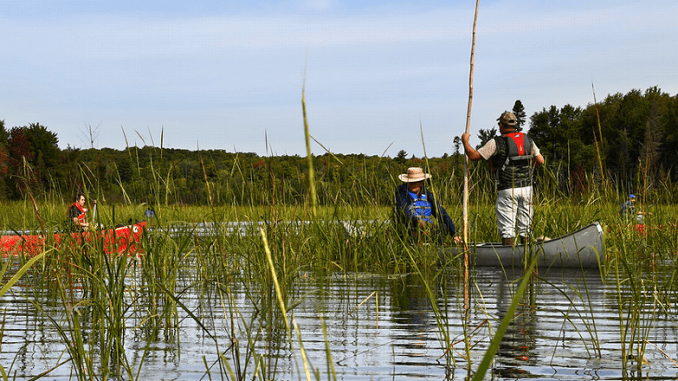
ANN ARBOR, Michigan, March 11, 2022 (ENS) – A $100,000 grant to help protect wild rice, one of Michigan’s most culturally and ecologically important native plants, has been awarded to the University of Michigan by the Michigan Department of Environment, Great Lakes, & Energy, EGLE.
Once plentiful in places like northern Michigan, now wild rice is threatened by climate change, habitat loss, uninformed harvesting practices, and degraded water quality.
The two-year grant from the Michigan Great Lakes Protection Fund to the University of Michigan Water Center will support the collaborative creation of a wild rice stewardship plan at the request of the Michigan Wild Rice Initiative Team.
The team includes representatives of each of the 12 federally recognized tribes in Michigan and several state agencies: EGLE; the state departments of Natural Resources, Agriculture and Rural Development, and Transportation.
“It began with our ancestors,” said Saginaw Chippewa tribal member Shannon Martin describing the path that took her and others to seek a partnership with the University of Michigan, U-M. The partnership, begun in 2017, is designed to facilitate reconnecting Anishinaabe communities – Native American and First Nation communities of the Great Lakes Basin – with seeds, and plant samples in the U-M ethnobotanical collections.
“We truly believe that when food is planted and it’s harvested or cultivated, or food is caught or trapped or taken in prayerful or a respectful way, then that food is medicine,” Martin told U-M Water Center’s tribal consultant Kevin Finney . “It’s healing. When you think about it, it’s not healthy to buy your food wrapped in cellophane on a piece of Styrofoam. That’s just not healthy living, it’s not sustainable.”
Wild rice is one of only two cereal grains that are native to North America. Native people harvest the wild rice by hand with non-motorized canoes to help preserve the all-natural product. By hand harvesting, only the mature ripe kernels are taken, ensuring the quality and taste and leaving the remaining immature kernels to ripen and fall back into the water to ensure the next year’s crop.
Michigan’s wild rice, Zizania palustris and Zizania aquatica, is native to the Great Lakes region and parts of Canada. Found in shallow waters of inland lakes, slow-flowing streams, and Great Lakes embayments, wild rice has ecological, social, cultural, and economic value.
Wild rice has been a staple in the diets of the native people for generations, and it is also a spiritual food, considered to be a gift from the Great Spirit or Creator.
This is especially true for Anishinaabe communities in the region, who know the plant as manoomin or mnomin.
“Manoomin, or wild rice is a gift given to the Anishinaabek from the Creator, and is a centerpiece of the nutrition and sustenance for our community. In the earliest of teachings of Anishinaabeg history, there is a reference to wild rice, known as the food which grows upon the water, the food, the ancestors were told to find, then we would know when to end our migration to the west. It is this profound and historic relationship which is remembered in the wild rice harvest on the White Earth and other reservations-a food which is uniquely ours, and a food, which is used in our daily lives, our ceremonies, and our thanksgiving feasts,” the White Earth Nation said in a statement.
The U-M Water Center, which focuses on collaborative, user-driven research, will partner with the Michigan Wild Rice Initiative Team to develop the Tribal-State Manoomin Stewardship Plan, engaging with the tribes to identify all elements of the plan and working with decision makers to secure commitments and resources for implementation.
The project advances a priority recommendation in the 2016 Michigan Water Strategy for the state to work with federally recognized tribes and other stakeholders with an interest in preserving and enhancing wild rice resources across the state.
Since the formation of the Michigan Wild Rice Initiative Team in 2017, the group has been working to protect, preserve, and restore wild rice and wild rice culture in Michigan through collaboration, education, research, policy, and stewardship, to enhance ecosystem health and benefit present and future generations.
In addition to the U-M wild rice project, U.S. Army Corps of Engineers researchers are working with the Lac Vieux Desert Band of Lake Superior Chippewa Indians and other tribes to help improve wild rice productivity in Michigan’s Upper Peninsula.
The U.S. Army Engineer Research and Development Center is supporting two six-year USACE Detroit District Planning Assistance to States studies to combine traditional knowledge and modern research to increase the production of wild rice.
Featured image: Tribal members seed wild rice in Michigan, as part of the Wild Rice Initiative restoration outreach and education efforts, August 30, 2019 (Photo by Todd Marsee, Michigan Sea Grant)
© 2022, Environment News Service. All rights reserved. Content may be quoted only with proper attribution and a direct link to the original article. Full reproduction is prohibited.



